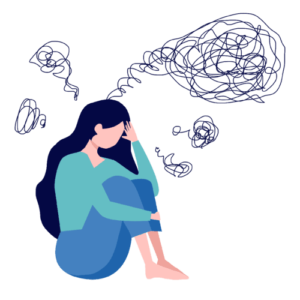
Trauma Induced OCD Assessment
Answer these simple questions to understand more about Trauma Induced OCD Assessment. We share instant results and keep your information confidential.

What is Trauma Induced OCD Assessment?
Trauma-induced OCD assessment involves evaluating individuals who have experienced traumatic events and subsequently developed symptoms of obsessive-compulsive disorder (OCD). This assessment aims to determine the extent to which trauma contributes to their OCD symptoms, exploring triggers, obsessions, and compulsions. Mental health professionals use standardized interviews, questionnaires, and clinical observations to assess the relationship between trauma and OCD manifestations. A comprehensive assessment helps tailor treatment strategies, which may include trauma-focused therapy, exposure therapy, and cognitive-behavioral techniques to address both the traumatic experiences and the OCD symptoms that have emerged as a result.
Who can benefit from this Trauma Induced OCD Assessment?
Individuals who have experienced traumatic events and are struggling with intrusive, distressing thoughts, as well as compulsive behaviors aimed at reducing anxiety, can benefit from a Trauma Induced OCD Assessment. This assessment helps identify if their symptoms are linked to trauma-related OCD. Through careful evaluation and diagnosis, individuals can receive appropriate therapeutic interventions, such as trauma-focused Cognitive Behavioral Therapy (CBT) and, if necessary, medication, to effectively manage and alleviate their symptoms. Early identification and intervention are key for improving their overall well-being and quality of life.


Trauma Induced OCD Assessment Accuracy
Assessing trauma-induced OCD’s accuracy can be complex. Accurate diagnosis requires a thorough evaluation by a qualified mental health professional. They consider symptoms’ duration, impact on daily life, and connection to trauma. A comprehensive assessment enhances understanding and informs appropriate treatment, whether therapy, medication, or a combination. Early intervention improves outcomes.
Types of Trauma Induced OCD Assessment
Comprehensive Evaluation:
A mental health professional, such as a psychologist or psychiatrist, will conduct a thorough assessment. This includes evaluating the nature of your obsessions and compulsions, as well as any potential traumatic experiences you’ve had.
Differential Diagnosis:
It’s important to differentiate between OCD and other trauma-related disorders, such as Post-Traumatic Stress Disorder (PTSD). Some symptoms may overlap, but a skilled clinician can distinguish between them.
Impact of Trauma:
Evaluate how the traumatic event has impacted your daily functioning, emotional well-being, and relationships. This helps understand the severity of trauma-related distress.
Co-Occurring Factors:
Assess for other mental health conditions that commonly co-occur with trauma and OCD, such as anxiety disorders, depression, or substance abuse.
Medication Evaluation:
Depending on the severity of symptoms, medication might be considered to help manage OCD and trauma-related distress. A psychiatrist can guide this process.
Individualized Approach:
Each person’s experience with trauma and OCD is unique. The assessment should be tailored to your specific history and needs.
Handling Trauma Induced OCD Issues
Handling OCD issues that are triggered by trauma can be particularly challenging, as trauma can intensify the symptoms and complicate treatment. If you’re dealing with trauma-induced OCD, it’s essential to approach your healing journey with sensitivity and care. Here are some suggestions to consider:
- Professional Support: Seek the help of a mental health professional who is experienced in treating both trauma and OCD. A therapist with expertise in trauma-focused therapies like Eye Movement Desensitization and Reprocessing (EMDR) or Trauma-Focused Cognitive Behavioral Therapy (TF-CBT) can be valuable.
- Address Trauma First: If your trauma is still actively affecting you, it’s often recommended to focus on trauma therapy before tackling the OCD symptoms. Managing the underlying trauma can help alleviate some of the triggers that fuel the OCD.
- Trauma-Informed Care: Work with a therapist who understands trauma-informed care. This approach recognizes the impact of trauma on an individual’s behavior, mental health, and well-being.
- Mindfulness and Grounding Techniques: Techniques such as deep breathing, meditation, and grounding exercises can help you manage anxiety and intrusive thoughts associated with both trauma and OCD.
- Safety and Coping Strategies: Develop safety plans and coping strategies for times when you’re triggered. These strategies can help you navigate difficult moments and prevent engaging in compulsions.
- Exposure and Response Prevention (ERP): Gradually exposing yourself to triggers, while resisting the compulsions, can be helpful. However, it’s essential to work with a therapist who can guide you through this process, especially when dealing with trauma triggers.
- Self-Compassion: Practice self-compassion and understand that you’re not to blame for your symptoms. Trauma-induced OCD is a complex interaction of factors, and being kind to yourself is crucial.
- Medication: If recommended by a psychiatrist, medication can be used to manage symptoms. Some medications can help with both trauma-related symptoms and OCD.
- Support System: Lean on friends, family, or support groups who can provide understanding and encouragement. Sharing your experiences can help reduce isolation.
- Journaling: Write about your experiences and emotions. This can help you process your thoughts and feelings related to both the trauma and OCD.
- Gradual Progress: Recovery is a gradual process. Set small, achievable goals and celebrate your progress along the way.
- Holistic Approach: Address your overall well-being by focusing on factors like sleep, nutrition, exercise, and stress reduction. These can all impact your ability to cope with trauma and manage OCD.
Remember, it’s crucial to work with mental health professionals who specialize in trauma and OCD to develop a personalized treatment plan. Every individual’s journey is unique, and finding the right strategies and support will be key to your healing process.